Greg's Top 51 Games of All Time, Installment 4 (20-11)
December 18, 2007 - Games
Looks like we're into the top twenty now. As I'm sure you're seeing by now, my own top 51 games don't entirely jive with the top games lists you'll see elsewhere. I leave out the games I haven't played, and I give emphasis to the games I've really loved, even when I last played them 20 years ago.
I've had a complaint that I'm including way too many commodore 64 games in my list. Looking over my list of 51, it includes seven Commodore games. Four of those, I'll defend vehemently: #40 was Maniac Mansion, my favorite of the old LucasArts Adventures. While most people prefer Monkey Island or Grim Fandango, few will argue that an old LucasArts title doesn't belong in a top 50 games list. Next, #30 was Pool of Radiance, the first of the legendary Gold Box games, which were D&D RPGs. Those were also fantastic. Third, #25 was Autoduel, which was in all ways an amazing game. Fourth, #16, which you can find described below. Now keep in mind that all four of these games were also available for DOS, and so are not exclusively Commodore 64 games.
Three I'll defend less are #36: Adventure Construction Set, #34: Mail Order Monsters, and the below-mentioned #15. They're just there because I loved them.
That said, on to the new items.
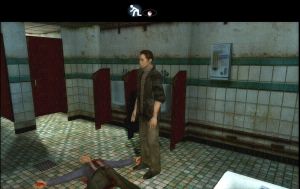 #20: Fahrenheit, A.K.A. Indigo Prophecy (PC) - Yes, I played both the American version and the European version. What made this game great is that while at its core it was an adventure game, but it incorporated a number of time-sensitive elements. For instance, at the game's outset, you awaken in a diner rest room with a dead body and realize that you've just killed someone, but don't know why or even who it is. Then, the game moves to a split-screen and you see a police officer in the diner leisurely moving towards the bathroom, and you realize that you've only got seconds to get out of there. Should you hide the body? Should you clean up all the blood? At the very least you should wash your hands.
#20: Fahrenheit, A.K.A. Indigo Prophecy (PC) - Yes, I played both the American version and the European version. What made this game great is that while at its core it was an adventure game, but it incorporated a number of time-sensitive elements. For instance, at the game's outset, you awaken in a diner rest room with a dead body and realize that you've just killed someone, but don't know why or even who it is. Then, the game moves to a split-screen and you see a police officer in the diner leisurely moving towards the bathroom, and you realize that you've only got seconds to get out of there. Should you hide the body? Should you clean up all the blood? At the very least you should wash your hands.
Soon, you find yourself playing the part of the police officers trying to find out what happened. The fact that you're playing two opposing roles makes the game really interesting. And the first half to two-thirds of the story is really good. Sadly, the story gets really weird at the end, but the majority of it is excellent. How often in a muder-mystery do you play the part of the murderer while retaining any mystery? It takes its toll though: Kane has a mental state gauge, and if it drops too far, he commits suicide and you lose.
There are also a good number of mini-games. They range from playing basketball or playing with a yo-yo to target practice at a shooting range to a sex mini-game. There's even a guitar-playing minigame that predates guitar hero. The big action sequences follow a formula similar to the minigames, but if you lose you die. These will have you performing specific mouse gestures or tapping arrow keys to evade enemies or dodge oncoming traffic. It's very cool. Fahrenheit even has a couple stealth sequences. I'm sure this game fell off a lot of peoples' maps, but its variety and uniqueness really places it high amongst my favorites. (my review)
 #19: Super Mario Galaxy (Wii) - The only game on my list that I haven't yet finished. I've never been the biggest fan of the Mario games - although I've played quite a few of them, I've never finished one. And I've never even played Mario 64. But after all the hype around Mario Galaxy, I had to check it out. And the game is very nice.
#19: Super Mario Galaxy (Wii) - The only game on my list that I haven't yet finished. I've never been the biggest fan of the Mario games - although I've played quite a few of them, I've never finished one. And I've never even played Mario 64. But after all the hype around Mario Galaxy, I had to check it out. And the game is very nice.
The game designers take liberties with gravity that play out really well, and the variety between levels adds a lot to the game. Many of the levels use the Wii controls in new and different ways. Although I'm sure the control schemes are borrowed from other Nintendo games such as Monkeyball, Rabbids, or the upcoming MarioKart, I've not played most of them, so it's new to me.
The hardest levels in the game are also optional, which is nice. The casual players can skip the super-hard stuff and still beat the game, whereas the hardcore players can get the satisfaction of playing very difficult levels. I've got to say - I was very impressed when Linda beat the "Sweet Sweet Galaxy" level.
I don't have a ton to say about the game as I'm only about 30 stars in, which is probably a bit less than halfway, but I'm enjoying it thoroughly.
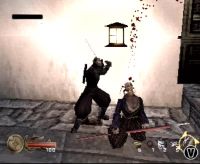 #18: Tenchu: Stealth Assassins (PS1) - They say you never forget your first, and Tenchu was my first stealth game. I'd go back and play it today if I had a copy, but I played this game years ago when I borrowed my friend's copy. To this day, rating purely on stealth action, I think the only game that's ever been better is the game I'll be putting in slot #1 when I finish this list. Ooh! Foreshadowing!
#18: Tenchu: Stealth Assassins (PS1) - They say you never forget your first, and Tenchu was my first stealth game. I'd go back and play it today if I had a copy, but I played this game years ago when I borrowed my friend's copy. To this day, rating purely on stealth action, I think the only game that's ever been better is the game I'll be putting in slot #1 when I finish this list. Ooh! Foreshadowing!
There was certainly a plot to the game, but not one memorable enough for me to recall a decade later. The game's bottom line was assassination. You'd be infiltrating a pirate camp or rescuing your master's daughter, and along the way you'd be sneaking up behind guards and executing them. If you pulled it off right, you'd see one of a number of assassination animations ranging from cutting your enemy's throat to breaking his back ouright. There were a number of these, and depending on your exact position before the killing blow, you'd see different ones. Without trying to come off too sadistic, this never, ever got old.
As in Thief, you got a number of cool ninja gizmos, the most important of which was your grappling hook. The grappling hook launched as if it were fired from a cannon, attached to nearly and surface, and then reeled you in fast enough to keep you flying through the air the entire way. Who knew ninjas could build things like that?
All in all, this decade-old game holds its place in my memory as one of the best stealth games I've ever played.
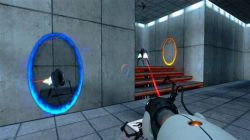 #17: Portal (PC) - Portal was supposed to be a neat add-on to Orange Box; an extra bonus. What we got instead was an excellent first-person puzzle comedy that many considered the best part of the package.
#17: Portal (PC) - Portal was supposed to be a neat add-on to Orange Box; an extra bonus. What we got instead was an excellent first-person puzzle comedy that many considered the best part of the package.
Although I don't think Portal was the best part of the package, I loved it. It's short, like Half-Life's episodes, but it's a clever blend of humor, action, and subtle and minimal storytelling. In that very Half-Life-like way, it starts out seeming like 100% gameplay with no story, and the story slowly emerges via gameplay elements as the computerized voice you hear and the props you see knit slowly together to form a background.
If by some freak chance you've not played Portal, download Steam right now and purchase The Orange Box. Now.
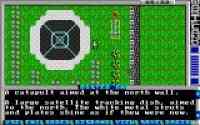 #16: Wasteland (C64) - We're now reaching the point where I'm in danger of gushing about every game on the list. It's hard for me to adequately explain here how good of a game Wasteland was, and why. But I'll try. Wasteland is a 1988 game for the Commodore 64 and PC. I've played and completed both versions. The game is set in a 21st century post-apocolyptic landscape, in Nevada. You create a group of four characters, "Desert Rangers", and can recruit up to three more NPCs.
#16: Wasteland (C64) - We're now reaching the point where I'm in danger of gushing about every game on the list. It's hard for me to adequately explain here how good of a game Wasteland was, and why. But I'll try. Wasteland is a 1988 game for the Commodore 64 and PC. I've played and completed both versions. The game is set in a 21st century post-apocolyptic landscape, in Nevada. You create a group of four characters, "Desert Rangers", and can recruit up to three more NPCs.
The game was very much a predecessor to Fallout, but this early version used a hybrid of the engines used by Ultima and Bard's Tale. While travelling around, you used Ultima's overhead view, but in battle you also received the battle view from Bard's Tale, wherein the upper-left of the screen showed a portrait of your enemy, the upper-right scrolled text detailing the events of the battle, and the lower half showed your characters' statistics. The system successfully melded the best elements from both systems such that you could maneuver strategically, hiding some characters behind walls, having others end up 32 feet from the enemy rather than in strict 10 foot increments as in Bards Tale. The only oddity was that when your entire party was knocked unconscious by enemies, the enemies would wait for you to wake up before continuing to attack.
Although the graphics never really contained gore, the text did the job. When you did tons of damage to an enemy, you'd get text descriptions such as "Joe Ranger does 64 damage to Thug, spinning him into a dance of death" or "Deth Snake does 110 damage to Mutated Rabbit, reducing it into an undertaker's nightmare". You could also explode enemies like a blood sausage, rip them into a scarlet side of meat, or reduce them to a thin red paste.
But as much as I enjoyed that text, my favorite was still the amazingly intimidating names of the robots you'd fight towards the end of the game. "Vanadium Vulture", "Fusion Octotron", "VTOL Auto-fire Robot", "Wire-guided Anti-personel Missile", "Stainless Steel Flechette rifle", "Sonar-targetted Proton Carbine", "Gauss Needle Projector", "Life-seeking Flamethrower" and "Mk 10 Turbo Meson Cannon" just to name a few.
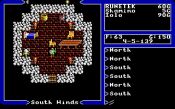 #15: Ultima V (C64) - Although Ultima 3 was the first in this series that I'd played, Ultima V was probably the first game that I ever got into hardcore, played for huge amounts of time, and completed. To this day, I don't think I've ever gotten the sense of satisfaction out of completing a game that I got out of Ultima V. I wrote the day I completed this game on a calendar - no lie.
#15: Ultima V (C64) - Although Ultima 3 was the first in this series that I'd played, Ultima V was probably the first game that I ever got into hardcore, played for huge amounts of time, and completed. To this day, I don't think I've ever gotten the sense of satisfaction out of completing a game that I got out of Ultima V. I wrote the day I completed this game on a calendar - no lie.
Now, at this point I've got to admit that the reason this game is this high on the list is because it meant so much to me personally. Not because of any objectively quantifiable factors about the game. But in its day, this game had unprecedented complexity and an amazing and complex storyline. I found it so amazing that I created a D&D campaign based on the game and ran that campaign weekly for years. PMD, a frequent commenter on this site, played the paladinesque fighter who was party leader for that group.
Ultima V let you assemble a party of characters and explore a huge world. You could get thrown in jail, gather reagents to cast spells, and carry on complex conversations with NPCs. It was an amazing game for its time, and if the engine and graphics were updated, it would be an amazing game today.
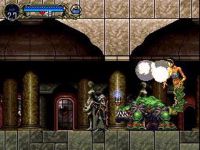 #14: Castlevania: Symphony of the Night (PS1) - There's a reason why you can't find this game on EBay for less than $100. It's the best Castlevania game ever produced. While the game's protagonist isn't a whip-wielding Belmont, its amazing symphonic soundtrack and huge amount of hidden extras make the game a classic that will long outlive the console for which the game was created.
#14: Castlevania: Symphony of the Night (PS1) - There's a reason why you can't find this game on EBay for less than $100. It's the best Castlevania game ever produced. While the game's protagonist isn't a whip-wielding Belmont, its amazing symphonic soundtrack and huge amount of hidden extras make the game a classic that will long outlive the console for which the game was created.
IGN seems to agree with me, as they placed this game at 15th place in their top 100 games list.
This was the first of the Castlevania games to really include RPG elements. Alucard would level up as he progressed through the game, and could gain some pretty damn cool equipment. AS much as I've enjoyed many of the GBA and DS versions of Castlevania, they never had equipment half as cool as that in Symphony of the Night. And they certainly never had music as good. I slowly came to realize when playing this game that certain pieces of equipment allowed certain special attacks. a quarter circle forward when wielding a certain sword would make Alucard throw the sword in a boomerang-like fashion. Pressing two buttons simultaneously while holding the shield rod and a shield would cast a spell - a different spell for each shield.
And just as I was coming to the game's end - the counter on the screen listed me as 97% complete, and my castle map was nearly fully revealed, I discovered the second castle: an upside-down version of the castle I'd just been through! There was more to the game! The counter actually went up to 212% if you found all the secret areas. This is one of my absolute favorite Playstation games. I hear that it's been made available on XBLA. If you've got a 360, you should download it.
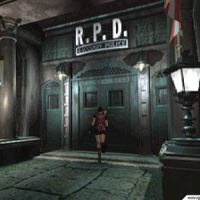 #13: Resident Evil 2 (PS1) - Although I'll admit the superiority of Resident Evil 4, Resident Evil 2 was for a long time my absolute favorite game. And it remains to this day the only game that's ever scared me. Pinnacle games recently cited this title in their article about games that define their genres, and as someone who has played through the game no less than five times, I've got to agree.
#13: Resident Evil 2 (PS1) - Although I'll admit the superiority of Resident Evil 4, Resident Evil 2 was for a long time my absolute favorite game. And it remains to this day the only game that's ever scared me. Pinnacle games recently cited this title in their article about games that define their genres, and as someone who has played through the game no less than five times, I've got to agree.
The absolute best thing to me about Resident Evil 2 is that the game creators specifically added moments to shock you and make you jump. And these moments were plentiful. I only wish more recent horror genre games would use this technique. You could be walking down a hallway you'd been through a half dozen times before, and a window would smash and zombies would come pouring through. I think their main shock device was sound - you'd be in a quiet room, and then a loud crash would always accompany whatever shocking event happened. One time, when I stepped on a rickety floor and fell through with a crash, it scared me so much I literally fell out of my chair. And I loved it. I'd always play this game in the dark with headphones. My only regret is that I can no longer experience those surprises for the first time.
The game had two CDs - one for each of the two characters you'd play. And there were actually four separate missions in the main game - a first and second mission for Leon and Claire. The second mission(s) were the best though. While they were 80% identical to the first missions, and thus somewhat repetitive, they added the one element that made this game great: The Tyrant. Throughout the game, you'd be intermittently pursued by a huge, unkillable, trenchcoat-wearing brute of a zombie. He'd appear out of nowhere, climb over balconies, and at one point even smash through walls to get to you. That time when he smashes through a wall is the most epic game moment I've ever experienced.
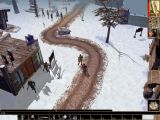 #12: Neverwinter Nights (PC) - By itself, Neverwinter Nights was good, but not outstanding. It may not actually have made this list. What made it outstanding to me was the ability not only to create your own worlds and games, but to actually add your own C-like code and program complex behaviors into the game.
#12: Neverwinter Nights (PC) - By itself, Neverwinter Nights was good, but not outstanding. It may not actually have made this list. What made it outstanding to me was the ability not only to create your own worlds and games, but to actually add your own C-like code and program complex behaviors into the game.
This is how I spent my evenings for almost exactly a year back in 2002. I created a game based on the setting my friend Rich Meister yes, that's actually his name and I had created in years prior. I coded a routine that would randomly interrupt your rest periods with random monsters. I coded a routine to implement slow bleeding-to-death rules rather than instant death, but only in multiplayer mode. I coded tons of custom scripted traps and effects. I can't believe I spent a year doing it all. And when I uploaded the near-final version, I put the whole thing behind me. I was done with it. Sad then that the file I'd uploaded was corrupted somehow, replaced with something written entirely in French. Now, the game I spent a year creating exists only on a CD I've got sitting in a case back at home. You can view the docs I uploaded here, if you're interested.
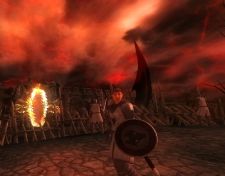 #11: Elder Scrolls IV: Oblivion (PC) - On its own, this game was very, very good. With the added user-created content, it was downright amazing. I pity anyone who played this game on the XBox 360.
#11: Elder Scrolls IV: Oblivion (PC) - On its own, this game was very, very good. With the added user-created content, it was downright amazing. I pity anyone who played this game on the XBox 360.
Console-scoffing aside, it was great to be playing a RPG in such a beautifully-rendered 3D world. The system for alchemy was amazing to me, and the way sword combat and bow combat worked was something I'd wanted in a game for a long time. The scripted battle scenes were amazing, and really very immersive. You felt like you were actually taking part in these epic earthshaking battles.
I put more hours into this game than I want to remember. Literally hundreds. I finished nearly every quest in the game. I didn't become a vampire, didn't complete the dark brotherhood quest, and probably missed a couple of the Daedric quests, but other than that I did everything. Guildmaster of every guild, arena champion, and of course I completed the game, although my first run took 119 hours.
Oblivion's skills are very well designed. Aside from the standard combat and magic skills, there are skills like acrobatics, which lets you jump higher. I think that's damn cool. And when a skill level reaches 25,50,75, and 100, you gain certain bonus abilities. For example, when your marksman skill reaches 50, you can zoom in on targets. When your armorer skill reaches 50, you can repair magical items. When your acrobatics skill reaches 100, you can actually jump off the surface of water if you time things right.
Oblivion has a bit of a strange and complex leveling system into which I went into detail in my post The Oblivion Paradox, and later revisited in The Oblivion Paradox Redux. Essentially, if you level up without planning carefully, the game may quickly grow too difficult. And if you plan too carefully, the game gets too easy. But overall, I still enjoyed the game. You can read my review here.
Well, that's it for this list. Stay tuned for the final ten - I'm going to try to post it before going on vacation next week.